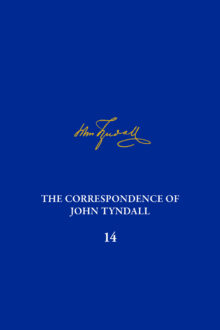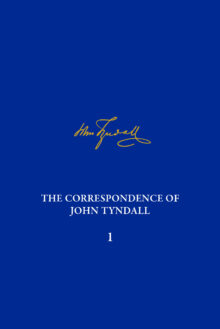
Gowan Dawson
Gowan Dawson is professor of Victorian literature and culture at the University of Leicester and honorary research fellow at the Natural History Museum, London. His books include Show Me the Bone: Reconstructing Prehistoric Monsters in Nineteenth-Century Britain and America and Darwin, Literature and Victorian Respectability.
The Correspondence of John Tyndall, Volume 14
The Correspondence, October 1873–October 1875
The 499 letters in the fourteenth volume of The Correspondence of John Tyndall cover a number of particularly intense and acrimonious disputes. More notably, this volume spans the period of the composition, delivery, and furious reaction to Tyndall’s famous—or, more accurately, infamous—Belfast Address. This prestigious lecture, which he delivered as the newly inaugurated president of the British Association for the Advancement of Science, has long been heralded as one of the most momentous events of the nineteenth century. The letters in this volume provide a new, and unprecedentedly detailed, account of all aspects of the era-defining address. For Tyndall himself, it afforded a new level of prominence as a public intellectual, and he deployed his position to engage directly with some of the most contentious issues in Victorian society, especially the role of religion in relation to science. But Tyndall’s expertise was also required on more practical matters, and the letters in this volume document his extensive role in determining official government policy on urgent questions such as safety at sea and public health. Additionally, they chart a dramatic shift in his personal life, with his initial correspondence with Louisa Hamilton, with whom he had previously communicated only through her family, marking the point where their burgeoning friendship developed into a formal relationship.
The Correspondence of John Tyndall, Volume 1
The Correspondence, May 1840–August 1843
The 230 letters in this inaugural volume of The Correspondence of John Tyndall chart Tyndall’s emergence into early adulthood, spanning from his arrival in Youghal in May 1840 as a civil assistant with just a year’s experience working on the Irish Ordnance Survey to his pseudonymous authorship of an open letter to the prime minister, Robert Peel, protesting the pay and conditions on the English Survey in August 1843. The letters, which include Tyndall’s earliest extant correspondence, encompass some of the most significant events of the early 1840s. Tyndall’s correspondents also discuss their experiences of British military expansion in India and economic migration to North America, among other topics. The letters show the development of many of the traits and talents, both mathematical and literary, that would subsequently make Tyndall one of most prominent men of science in Victorian Britain. They also afford broader insights into a period of almost unprecedented social upheaval and cultural and technological change that ultimately shaped Tyndall’s development into adulthood.


